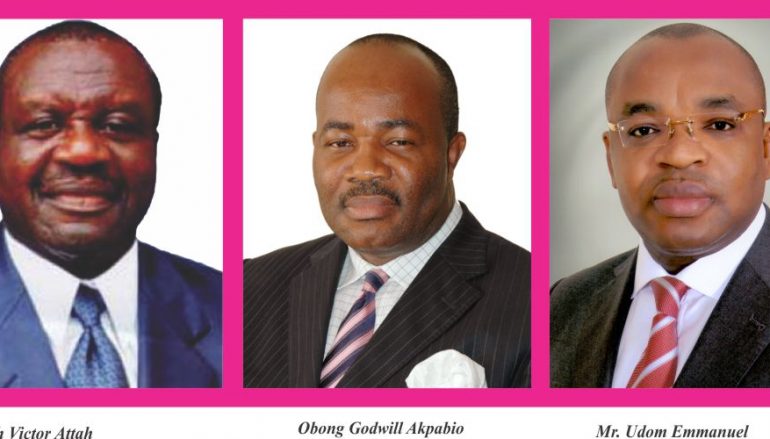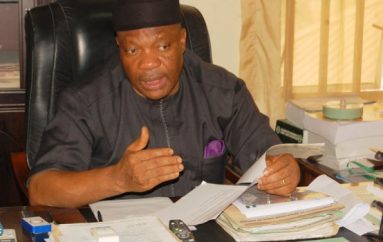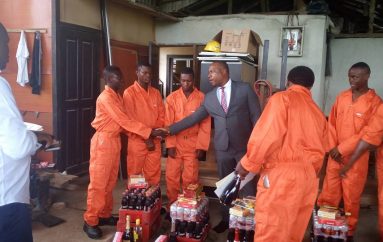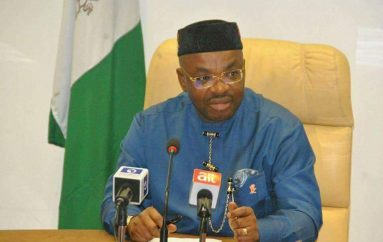
PDP: 17 Years of Keeping the Promises
For 17 years, the ruling Peoples Democratic Party (PDP) in Akwa Ibom has religiously fulfilled the social contract between it and the people by providing inspiring leadership, recording significant achievements and deepening democratic roots and nuances in line with the vision of the party, writes Dominic Akpan.
From the ashes of an outgoing military regime emerged the Peoples Democratic Party (PDP) in August 1998. Some progressive politicians who came together under the aegis of G-34 to say no to prolonged military rule formed the nucleus and rallying point of the five associations that formed the PDP.
On September 6, 1998, the party was officially launched in the state at Ibom Hall. Since then, the PDP has emerged victorious in everything that has to do with electoral contests in the state.
In the December 5, 1998, local government elections conducted by the Independent National Electoral Commission (INEC), the party, which had in the space of four months set up structures in the 329 wards and 31 local government areas of the state, proved that it was the preferred political platform by the people.
An impressive record of 19 chairmanship seats out of 31and 242 councillorship seats out of 329 in the council polls meant that the party was set to capture the January 1999 governorship and House of Assembly elections as well as the presidential and National Assembly elections.
The local government councils won by the PDP in the chairmanship election were Abak, Eastern Obolo, Eket, Essien Udim, Ikono, Ini, Ikot Abasi, Ibeno, Ikot Ekpene, Ibiono Ibom, Ibesikpo Asutan, Mkpat Enin, Mbo, Nsit Ibom, Obot Akara, Oruk Anam, Oron, Okobo and Uyo.
Victory for the party was overwhelming and convincing in the governorship and House of Assembly elections. PDP won the governorship seat and 20 out of the 26 seats in the assembly. In addition, the party won in the three senatorial districts and nine out of 10 federal constituencies. That was a good starting point for the PDP-led administration.
It would be recalled that while the candidates of the party were campaigning throughout the state, they made it clear that their focus in government would be the promotion of the welfare of the people as contained in Section 14, Sub-section 2 of the Constitution of the Federal Republic of Nigeria.
‘‘The security and welfare of the people shall be the primary purpose of government: and the participation by the people in their government shall be ensured in accordance with the provisions of this constitution,’’ the constitutions states.
The candidates also told the people during the campaigns that they would implement the manifesto of the party if elected into power.
So, when Obong Victor Attah was inaugurated as governor on May 29, 1999, he had a set of programmes already drawn up for implementation for the promotion of the welfare of the people.
Part of the manifesto of the party states that it shall pursue sustainable development through sound education; basic healthcare; abundant food production; rapid industrial growth; good housing; full employment; improved infrastructure; efficient transport; regular power supply and basic services.
‘‘ As a party, we shall be committed to the principle of participatory democracy that lays emphasis on the welfare of our people.’’
He laid the foundation for Akwa Ibom State to take off and be a state to envy. This, he did, by initiating projects that will enhance the economic viability of the state. This included the Ibom International Airport, Ibom Power Company, Le Meridien Ibom Hotel and Golf Resort and Ibom Science Park. He also constructed and dualised some major roads in the state. Some of these roads included Atiku Abubakar Way, Nwaniba, a section of Oron Road, Olusegun Obasanjo Way, formerly Abak Road; constructed Itu, Ikpa and Uyo Village Roads. Many internal roads within Uyo Metropolis were constructed to reflect the investment aspiration and cosmopolitan status of the state. Some of the roads were the eight-lane Edet Akpan Avenue, Ibom Plaza Bye pass as well as internal roads in Ewet Housing Estate.
Roads constructed outside Uyo Metropolis during Obong Attah’s tenure included Nung Udoe-Ikot Ubo, urban roads in Abak, Eket and Oron Local Government Areas.
On economic front, he reactivated the Champion Breweries and privatized it, established Universal Energy so that the state could participate in the exploration of crude oil as marginal field operator and invested in the Econet Telecommunications, now Airtel .
Provision of affordable housing was also one of the priorities of that administration. He built 50 unit houses in the 31 local government areas, constructed Shelter Afrique Estate through public-private-partnership, and completed the State Secretariat by building additional blocks. He also named the secretariat after the first indigenous military administrator of the State, Idongesit Nkanga.
In the area of healthcare, the PDP-led administration built three new hospitals at Ukpum, Abak; Odoro Ikpe in Ini and Amamong in Okobo; upgraded some health facilities and provided equipment in the general hospitals.
More than that, Obong Attah initiated urban water schemes with water works in about 10 local government areas to articulate clean and safe water for the citizens of the state.
Obong Attah adopted a deliberate policy of patronising local contractors. This was a form of empowerment to the people. The Inter-Ministerial Direct Labour job was initiated to further create a platform for the patronage and empowerment of the people. Through this initiative, educational and health facilities were upgraded.
In the area of education, the administration established the Akwa Ibom State University of Science and Technology, but was later converted to Akwa Ibom State University (AKSU).
From the highlight of the major achievements of Obong Attah, it was clear that when his administration ended in 2007, he fulfilled part of the social contract the party entered into with Akwa Ibom people.
However, before the second civilian governor completed his two-terms of eight years tenure, the PDP had re-enacted the 1999 victory in the 2003 general elections, this time, on a higher scale.
The party won the presidential and governorship elections. It also won the three senatorial district seats, nine out of 10 federal constituencies and 24 seats in the State House of Assembly.
Expectedly, the following year, the party swept the councillorship polls, winning 316 out of 329 seats. There was no chairmanship election because the Akwa Ibom State House of Assembly had in 2003 amended the Local Government Administration Law 2000 and replaced the presidential system with the parliamentary system.
In line with the provisions of the parliamentary system, the party that won the majority councillorship seats in each local government areas was empowered to form government.
Therefore, having secured majority councillorship seats in 30 local government areas, PDP councillors went on to form government by constituting an Electoral College to elect the heads of council.
It was expected that the party’s victory run would continue in the 2007 general elections. As expected, the party’s victory was total and massive. Again, the party won the governorship election and for the first time, all the seats in the House of Assembly.
However, the party could not break the jinx in the National Assembly polls. Although the party won in the three senatorial districts, it however could not win the 10 federal constituency seats. It won in nine federal constituencies.
The local government elections, which were conducted in 2012, followed similar pattern. PDP won in 30 out of 31 local government areas.
After his inauguration on May 29, 2007 as governor, Obong Godswill Akpabio who had worked with Obong Attah as commissioner in different ministries, swung into action immediately. He had the benefit of knowing the status of the projects because he was a key member of the previous administration.
‘‘As a long-standing insider of the present administration, I share the passionate desire to realize the governor’s vision that set Akwa Ibom State on the path to national and regional pre-eminence through projects,’’ Akpabio said in his book, My Vision for a Greater Akwa Ibom.
Akpabio commenced his administration by adopting the uncompleted projects of his predecessor and integrated them into his plan for the benefit of the people of Akwa Ibom. These projects, which included the Ibom International Airport, Ibom Power Plant and a section of Le Meridien Ibom Hotel and Golf Resort, which had opened for business during Attah’s tenure, were completed.
The original concept of Akwa Ibom State University of Science and Technology as envisioned by Obong Attah, was however reviewed. In its place, Akpabio adopted the concept of a conventional university. He established Akwa Ibom State University (AKSU) with the main campus at Ikot Akpaden in Mkpat Enin Local Government Area. The other campus is at Obio Akpa in Oruk Anam Local Government Area.
In the eight years of PDP-led government under Akpabio, the scoresheet revealed an all-round excellent performance in education, road, urban infrastructure, rural development, electricity, agriculture, health and transport.
In his development approach, Akpabio was guided by the social contract between the people and the party. To him, keeping the promise he gave the people to obtain their votes is the first and ultimate requirement in keeping the tenets of the social contract.
In the area of education, he initiated free and compulsory education programme from primary to secondary school level. In addition, he paid N100 subvention per pupil in a term in the primary school and N300 per student in senior secondary school for administrative cost as well as massive renovation and reconstruction of schools across the state. There was also massive rehabilitation and reconstruction of school blocks, provision of science and laboratory equipment, construction of hostels and supply of desks.
Provision of massive infrastructure was one of the priorities of the Akpabio administration. He dualized and constructed many roads, some of which included Ekim Itam-Ikot Oku Ikono; Abak-Ikot Ekpene; Afaha Obong-Etim Ekpo-Iwukem, with a spur to Urua Inyang; Itak- Nung Udoe-Use Ikot Amama, Ikot Ubo-Ukanafun; Uyo-Ikot Umo Essien; Aka-Nung Udoe, Etebi-Enwang and the Third-Ring Road.
The administration also constructed urban roads in Eket, Ikot Abasi, Ikot Ekpene and Uyo, among others. He also constructed the international stadium, flyovers, urban renewal and regeneration programme.
Under the Women Agro Entrepreneurship Development Programme (WAEDEP), 4500 and 2000 women received an interest-free loan of N250,000 each for agro businesses.
Also, 620 youths were empowered with N500,000 each under the Integrated Farmers Scheme (IFS) in 2009 and another 910 participants for 2010.
A world-class specialist hospital at Ekit Itam, Pediatrics Block at the University of Uyo Teaching Hospital (UUTH), an oxygen plant at General Hospital, Ikot Ekpene, three new primary health centres in the three senatorial districts, 31 state-of-the-art ambulances are some of Akpabio’s signature in the health sector.
The Akpan Andem Market Phase II, rehabilitated Government Guest Houses in Uyo, new Banquet Hall, Government Lodge, office, 3 -Star Hotel at Ikot Ekpene, Tropicana and Entertainment Centre also bear Akpabio’s signatures.
To strengthen the information machinery of government, a digital ultra-modern outside broadcasting van, new and transmitters were procured for the Akwa Ibom Broadcasting Corporation, while a new Goss Community Press was purchased for the Akwa Ibom Newspaper Corporation.
In 2011, PDP again swept the polls, but conceded defeat in Uyo Federal Constituency and Uyo State Constituency to the then Action Congress of Nigeria (ACN), now All Progressives Congress (APC). The following year, the party recorded massive victory in the council elections, winning for the first time, all the chairmanship seats.
Akpabio’s two terms ended in 2015. As usual, the party’s victory run continued in that year’s general elections. This time, PDP only conceded defeat in the House of Assembly election in UrueOffong/Oruko State Constituency.
Governor Udom Emmanuel, a former secretary to the state government (SSG), emerged from that election to continue the relay race in executive leadership in the state.
While he was campaigning for votes, he made it clear that his focus would be industrialisation of Akwa Ibom. This promise was reinforced in his inaugural speech.
‘‘I stand before you today, not as a master but as a servant and not as a boss but as a co-labourer. I accept, with great humility and sense of responsibility, the mandate you have freely given to me to hold power in trust for you are your governor. You have kept your part of the covenant and I intend to keep my part by executing the programmes I enunciated to you during my official declaration to run for the office of governor.
‘‘ To leverage and build on the Uncommon Transformation of the Governor Godswill Obot Akpabio administration.
‘‘ To transform the economy of our state via industrialization and sustain public-private sector initiative, thereby opening up opportunities for growth and improved living standards,’’ Governor Emmanuel said.
One year in office today, the governor has demonstrated, despite paucity of funds, that campaign promises are meant to be kept.
He started by performing ground-breaking ceremonies for the Automobile Assembly Plant in July 2015,
Electric Meter Manufacturing Plant and Light Emitting Device Manufacturing Plant.
‘‘ This car assembly plant in Itu will represent the first chapter in the industrilaisation book of this administration, which we have opened today.
‘‘ We stand ready and committed to provide jobs for the people of Akwa Ibom State,’’ the governor said during the ground-breaking ceremony of the automobile industry at Ikot Ukap Itam.
The governor is passionate about investment in the petroleum sub-sector. He disclosed that three private refinery operators have indicated interest to start operations in the State.
He stated during the monthly prayer meeting in Government House recently that already, work has commenced at the site of one of the three refineries located along Eket – Ibeno Road.
On the other hand, the Governor is considering the possibility of opening up talks with promoters of Amakpe Refinery in Eket, which construction was abandoned due to disagreement between the previous administration and the investors.
There are also plans to establish depots in Ikot Abasi and Mbo Local Government Areas. In the area of agro-allied industries, the state government is establishing a fertilizer plant, coconut refinery and a hatchery.
In furtherance of the governor’s industrialization agenda, the Peacock Paint Industry was reactivated and is currently producing paints, while plans are on to bring back Qua Steel, Plasto Crown and Quality Ceramics to life.
The flagship of Udom’s industrialization plan is construction of Ibom Deep Seaport and Ibom Power Company. To facilitate the development of the seaport, a Technical Committee was set up. This committee is headed by Mfon Usoro, a lawyer and former director-general of the Nigerian Maritime Administration and Safety Agency (NIMASA).
There are committees on Foreign Direct Investment (FDI) and Agriculture and Food Sufficiency.
The idea behind the setting up of these committees is to encourage investors to come in and invest in Akwa Ibom.
Over 1000 youths have been engaged for ORACLE training and certification, while 200 others were sent to Israel for training in agriculture, with another 200 trained in the power sector.
On the other hand, construction work is in progress on Eket-Ibeno; Eket-Etinan; Ikot Udom in Ibiono Ibom and Etinan-Ndon Eyo Roads as well as Ikot Ekpuk-Ikot Edeghe-Ikot Usop Road in Mkpat Enin.
Also, Eket urban remodeling is on course.
Today, construction work on information Drive, one of the internal roads in Uyo, constructed by Governor Emmanuel, has been completed.

So far, the one year of Governor Emmanuel has been inspiring and eventful. After receiving the relay baton from his predecessor last year, the governor started the relay race with a vision to take Akwa Ibom to the Land of Fulfillment. He is doing this by keeping the promise and implementing the manifesto of the PDP.

 List of Newly Elected Chapter Officers
List of Newly Elected Chapter Officers  Inauguration of Newly Elected Ward Executive Officers
Inauguration of Newly Elected Ward Executive Officers  Gov Emmanuel Dedicates Victory To God, Akwa Ibom People
Gov Emmanuel Dedicates Victory To God, Akwa Ibom People  Paul Ekpo: A Harvest Of Mercurial Performance
Paul Ekpo: A Harvest Of Mercurial Performance 


